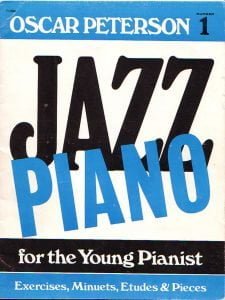Browse in the Library:
Or browse in the categories menus & download the Library Catalog PDF:
Oscar Peterson Piano Moods – “I Love You Porgy” (Gershwin) (sheet music)
Download Oscar Peterson’s sheet music in our Library.

Oscar Peterson
Oscar Peterson, in full Oscar Emmanuel Peterson, (born August 15, 1925, Montreal, Quebec, Canada—died December 23, 2007, Mississauga, Ontario), Canadian jazz pianist best known for his dazzling solo technique.
In 1949 Peterson went to the United States, where he appeared in one of jazz promoter Norman Granz’s concerts at Carnegie Hall, New York City. He was associated with Granz for most of the rest of his career, touring the world with Granz’s all-star Jazz at the Philharmonic troupe and recording prolifically for Granz’s record labels. Art Tatum and especially Nat King Cole were important influences on Peterson’s style. Like Cole’s early trio, the Oscar Peterson Trio that first became popular featured piano, bass (Ray Brown), and guitar, most notably Herb Ellis (1953–58). When Ellis left the group, he was replaced by drummer Ed Thigpen (1959–65).
Cascades of many notes characterized Peterson’s playing. His earlier work, if often glib, was nevertheless invariably swinging. In the 1970s he began playing frequent solo concerts and duets, often with bassist Niels-Henning Ørsted Pedersen. These proved the most rewarding medium for his talents, and he became one of the most popular jazz pianists of his time. His 1974–75 duet albums with trumpeters Dizzy Gillespie, Roy Eldridge, Harry Edison, Clark Terry, and Jon Faddis demonstrated generous warmth and sensitivity. His recordings won eight Grammy Awards. In 1999 he received the Japan Art Association’s Praemium Imperiale prize for music.
Peterson continued to perform until 2006, although his public appearances became sporadic after a stroke in 1993 affected the use of his left hand as well as his ability to walk. He was the author of Jazz Exercises and Pieces (1965) and Oscar Peterson New Piano Solos (1965). His autobiography, A Jazz Odyssey: The Life of Oscar Peterson, was published in 2002.
Piano moods
The material here was recorded for the Verve and MPS labels, and this two-disc, import retrospective of the work of legendary pianist Oscar Peterson is not only representative, but solid from top to bottom, showcasing many of his finest moments on wax in both live and studio recordings with his great trio of Herb Ellis and Ray Brown as well as in other settings. This is as fine an introduction as there is and, for the money, simply cannot be beaten.
2 cds tracklist includes:
Disc 1
1. Summertime (3:51)
2. I Love Paris (2:12)
3. Georgia on My Mind (3:47)
4. It Ain’t Necessarily So (4:00)
5. Girl Talk (5:35)
6. People (3:32)
7. Someone to Watch Over Me (4:17)
8. This Guy’s in Love With You (3:48)
9. Waltz for Debby (5:53)
10. Who Can I Turn To? (4:57)
11. Yesterday (4:04)
12. Days of Wine and Roses (2:42)
13. Django (5:16)
14. I Loves You, Porgy (6:21)
15. It’s Impossible (6:57)
16. It Never Entered My Mind (6:00)
17. Ev’ry Time We Say Goodbye (2:21)
Total Time: 75:40
Disc 2
1. Night Train (4:53)
2. Surrey With the Fringe on Top (2:37)
3. Fly Me to the Moon (4:41)
4. Baubles, Bangles and Beads (4:15)
5. I Concentrate on You / Moon River (6:28)
6. Just in Time (1:53)
7. The Windmills of Your Mind (5:05)
8. Here’s That Rainy Day (4:09)
9. If I Should Lose You (5:23)
10. Bess You Is My Woman (3:32)
11. Watch What Happens (6:14)
12. In the Still of the Night (2:53)
13. The Tender Trap (2:45)
14. Come Rain or Come Shine (4:29)
15. I’ve Grown Accustomed to Her Face (6:38)
16. When I Fall in Love (5:17)
Jazz
Jazz, musical form, often improvisational, developed by African Americans and influenced by both European harmonic structure and African rhythms. It was developed partially from ragtime and blues and is often characterized by syncopated rhythms, polyphonic ensemble playing, varying degrees of improvisation, often deliberate deviations of pitch, and the use of original timbres. Any attempt to arrive at a precise, all-encompassing definition of jazz is probably futile. Jazz has been, from its very beginnings at the turn of the 20th century, a constantly evolving, expanding, changing music, passing through several distinctive phases of development.
Browse in the Library:
Or browse in the categories menus & download the Library Catalog PDF:
